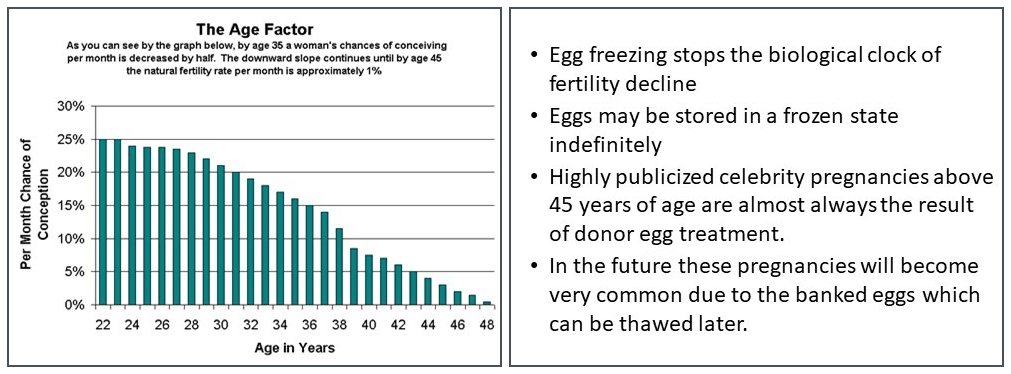Egg Freezing and Banking
The Frozen Egg’s Story:
Women are born with about 1-2 million eggs to use during their lifetime; from birth to menopause there is a gradual and continuous process of depletion. At puberty, women will have about 300,000 eggs and by menopause all the eggs are depleted.
On average, women will ovulate about 300 times during their reproductive years, and with each cycle a group of several eggs compete with each other to be the one that is ultimately released. In the natural cycle the remainder of the eggs are absorbed by a process called apoptosis.
The decline in egg quality is more rapid in the later ages (>35 years), due to irreparable DNA damage as they age- like the other cells in the body. So, the best chance of a normal pregnancy and delivery is at the younger ages.
The loss of egg quality accelerates at the age of 35 and gets more pronounced at age 37 or 38. Though the average age of menopause is 51, it is rare for a woman to have a successful live birth in her mid- 40s. This is due to chromosomal abnormalities in the embryos created with over 90% of embryos being abnormal in a 44 year-old woman. This loss of fertility due to age can be accelerated by smoking, drugs abuse, chemotherapy or radiation exposure.
How to Preserve Egg Quality?
Advances in egg cryopreservation, also known as egg freezing, have shown great promise. The breakthrough technology of vitrification (a rapid freezing process FDA approved in 2013) now makes it readily possible to suspend a woman’s biological clock. It is fascinating to note that the uterus does not age due to an enzyme in the endometrium called telomerase. This enzyme is also present in some other tissues, such as bone marrow, brain and heart. When the woman is ready to use her frozen eggs, they are thawed individually and fertilized using in vitro fertilization. The thawed egg has not aged, and neither has the uterus, and hence the pregnancy rates are expected for the age of the woman at the time of her egg banking.
Who would benefit from egg banking?
- Women who lack a current partner and desire to suspend their “Biological Clock”
- Women who have a committed partner /spouse but not ready to have children
- Women who want to preserve fertility for social reasons
- Women undergoing cancer treatment utilizing chemo or radiation therapies which could damage ovarian reserve
- Ideal age for banking is prior to 36-37 years old
Advantages of Egg Freezing
- Pregnancy rate is higher as it relates to the chronological age of the woman when the eggs were vitrified
- Miscarriage rate is lower because it is linked to the age of the egg when frozen and not when thawed
- Allows pregnancy to be delayed
- An option for women who do not have a current partner or desire to delay pregnancy
- Less controversial than embryo freezing since the egg is unfertilized
- Low risk, cost-effective method for fertility preservation
Disadvantages of Egg Freezing
- There is no live birth rate that is 100% at any age or number of eggs banked
- May create unrealistic expectations (see graph below for pregnancy success rates)
- Although eggs and the uterus do not age in the setting of egg banking, uterine fibroids, adenomyosis, medical co-morbidities (like high blood pressure, diabetes, heart disease), and other issues can arise and reduce the chance of success
- Cost of banking and storage fees may not be covered by insurance, with cancer patients sometimes an exception
- Some women will never need the eggs banked and will conceive on their own naturally in the future obviating the need for the banked eggs
- Risk to the baby? There are more than 6 million babies born worldwide from IVF. There may be a small increased risk of congenital anomalies with IVF of 2-3% on average higher than in natural conceptions
- Pregnancies from a frozen egg may have higher risk of LGA and preeclampsia particularly if fresh embryos are transferred.

How many Egg Retrievals will I need? Age, Number of Oocytes and Pregnancy Rates
Studies show the age group of donors 30 -34 years will require about 20 eggs retrieved and frozen or about 2 Egg Retrievals to get approximately 80% success in achieving a single pregnancy.
For women who are 34-37 years old with normal ovarian reserve, one would expect on average 13 eggs per retrieval. Therefore, it may take 2 egg retrievals to reach the desired number of mature eggs of about 15-20.
Women between the age of 38 and 40 will require 25 eggs or about 3-4 Egg Retrievals to obtain a 80% chance to have a single pregnancy.
Statistically and generally, 17 percent of women will reach the desired number of eggs within the first cycle, 47 percent within the 2nd cycle, 25% by the 3rd cycle and 10% by the 4th cycle.
On average, women over the age of 40 or with poor ovarian reserve may need approximately 3 retrievals or more to obtain 25 eggs.
Women in the age group of 41-42 will require about 30 eggs or about 4-5 Egg Retrievals to get approximately 50% success in achieving a single pregnancy.
Egg Freezing Fees and Costs
We invite those interested to learn about our egg freezing fees and costs here.
Why Washington Fertility Center?
- Leader in Egg Vitrification technology.
- Over 10 years of experience in Egg Vitrification.
- Small, boutique clinic offering Dedicated and Caring Team working closely with each patient.
- Personalized Care and Excellent Customer Service.